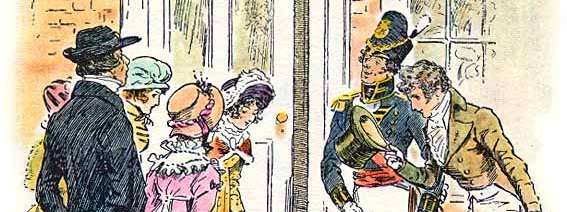Tip 2: Don’t Be a Wickham
Pride and Prejudice’s infamous cad, George Wickham, might seem to be the last person qualified to help one get a job since he spent the entire novel trying to obtain a living by scheming to compromise the virtue of a well-connected young girl and then force her friends and family to pay him to marry her. A job was not something he found exactly palatable.
Yet, when I came across the next job interview tip: “Don’t bad-mouth a former employer,” I immediately thought of Wickham.
Bad Forum…and Bad Form
Let’s face it, interview for a job, and you’re more than likely going to face the question, what was it like working for your former employer/manager/boss? Or perhaps it will be worded as: what did you like or dislike about your previous job? Or they may ask you to describe your best boss and your worst boss. The idea is always the same. The interviewer is seemingly providing you an opportunity to vent, air your dirty laundry, or tell on that mean, old jerk of a boss you once had. Don’t fall for it. This is not the forum. This is not a karmic pay-back session. You’re not writing a tell-all book. You’re interviewing to work for this person. His or her opinion of you is going to matter.
Even though Wickham is not asked any variation of the worst boss question, he volunteers an answer and, in doing so, provides us with an object lesson on what not to do.
Wickham’s Worst Boss Ever
In chapter sixteen of Pride and Prejudice, George Wickham famously bad-mouths former employer, Mr. Fitzwilliam Darcy, hoping it will buy him something and it does, for a time. The slighted Elizabeth is all-too eager to hear her arch nemesis (the non-dancing, pride-wounding Mr. Darcy) taken down off his self-mounted high horse, so she is inclined and predisposed to believe Wickham’s tale of dirty-dealings on the part of Mr. Darcy.
However, it is worth noting that before dishing, Wickham takes all of the necessary precautions to make sure his story will be well-received. First, he feels Elizabeth out by asking:
“…Are you much acquainted with Mr. Darcy?”
Elizabeth candidly (if not unwisely) tells him that she finds Mr. Darcy disagreeable and that everyone in the whole neighborhood dislikes him and is disgusted with him. Having established and confirmed Elizabeth’s hatred of Darcy, Wickham feels at liberty (in the interest of open and honest communication, wink, wink) to launch into a full disclosure of past wrongs.
On a job interview, the interviewee may be fooled into believing that his recounting the wrongs committed by a former bad boss will likewise be well-received. After all, didn’t the interviewer invite you to share? So he/she must really care about your feelings. As I said earlier, do not fall for this.
What Are You Griping About?
Wickham’s description of Mr. Darcy as an employer (of sorts) proceeds as follows:
“His behaviour to myself has been scandalous; but I verily believe I could forgive him anything and everything, rather than his disappointing the hopes and disgracing the memory of his father.”
…and as if that wasn’t enough, he continues…
“I have been a disappointed man, and my spirits will not bear solitude. I must have employment and society. A military life is not what I was intended for, but circumstances have now made it eligible. The church ought to have been my profession—I was brought up for the church, and I should at this time have been in possession of a most valuable living, had it pleased the gentleman we were speaking of just now.”
“Indeed!”
“Yes—the late Mr. Darcy bequeathed me the next presentation of the best living in his gift. He was my godfather, and excessively attached to me. I cannot do justice to his kindness. He meant to provide for me amply, and thought he had done it; but when the living fell, it was given elsewhere.”
“Good heavens!” cried Elizabeth; “but how could that be? How could his will be disregarded? Why did you not seek legal redress?”
“There was just such an informality in the terms of the bequest as to give me no hope from law. A man of honour could not have doubted the intention, but Mr. Darcy chose to doubt it—or to treat it as a merely conditional recommendation, and to assert that I had forfeited all claim to it by extravagance, imprudence—in short anything or nothing. Certain it is, that the living became vacant two years ago, exactly as I was of an age to hold it, and that it was given to another man; and no less certain is it, that I cannot accuse myself of having really done anything to deserve to lose it. I have a warm, unguarded temper, and I may have spoken my opinion of him, and to him, too freely. I can recall nothing worse. But the fact is, that we are very different sort of men, and that he hates me.”
“This is quite shocking! He deserves to be publicly disgraced.”
“Some time or other he will be—but it shall not be by me. Till I can forget his father, I can never defy or expose him.”
Elizabeth honoured him for such feelings, and thought him handsomer than ever as he expressed them.
“But what,” said she, after a pause, “can have been his motive? What can have induced him to behave so cruelly?”
“A thorough, determined dislike of me—a dislike which I cannot but attribute in some measure to jealousy. Had the late Mr. Darcy liked me less, his son might have borne with me better; but his father’s uncommon attachment to me irritated him, I believe, very early in life. He had not a temper to bear the sort of competition in which we stood—the sort of preference which was often given me.”
Wow! Poor Wickham. Just in case you missed it, Mr. Darcy scandalously, dishonorably, hatefully, jealously, and vindictively denied his father’s dying wish, thereby cheating a decent, hard-working, honest man out of his rightful living. Tsk, tsk.
Initially, Wickham’s story had its intended effect. But on second blush, after Elizabeth calmed down and could see things clearly (and after receiving a certain letter from a certain gentleman), she realized that Wickham had misrepresented the facts in his favor and Wickham is exposed as a slimy, duplicitous con artist.
The same thing will happen to you on a job interview if you bad-mouth a former employer. Well, maybe you won’t be exposed as a con artist (it’s probably not that serious), but you certainly won’t win any brownie points. The only thing you’ll accomplish is to make yourself look bad…and immature…and like a whining, hard-to-please, maladjusted, indiscreet complainer. Which means you probably just talked yourself out of a job.
Err on the Side of Diplomacy
Wickham would have been better off if he’d heeded the adage, ‘if you can’t think of something nice to say, don’t say anything at all.’ Of course on an interview, questions can’t exactly be met with silence, but you can and should provide a neutral answer.
Let’s give Wickham a mulligan, shall we?
Imagine Elizabeth and Wickham at Aunt Phillip’s house.
Elizabeth: So, Mr. Wickham, I hear you’re the son of Mr. Darcy’s steward? What was it like working for that family?
Wickham: I learned a lot from that experience. Mr. Darcy’s father was wonderful person. He, of course, died and left the estate to his son, Fitzwilliam. He and I may not have always seen eye to eye but, I must say, working for him taught me a lot about what types of management styles I work with the best.
Elizabeth: (to herself) Drat! I was hoping to get the dirt on that jerk Darcy, but this tactful guy isn’t giving me anything!
Good answer, George.
Next time, we’ll borrow a page from another improbable source and see what we can learn from Mrs. Bennet.









